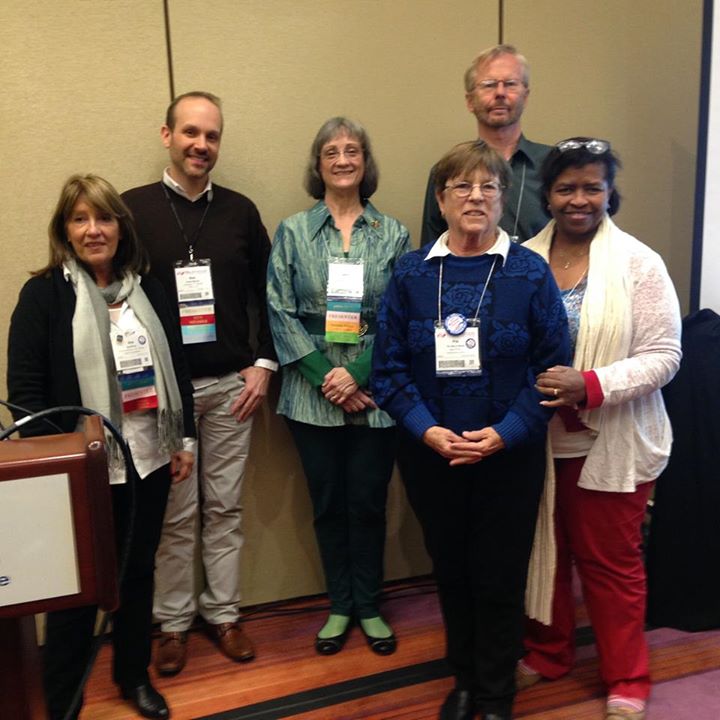|
Every year the Affiliate Leadership Council organizes the
Affiliate Editors’ Workshop at TESOL Conventions. This year, the event
had a preliminary stage which focused on four topics of interest that
had come up in previous workshops. These topics were reviewed by the ALC
team who considered it would be a good opportunity for affiliates to
discuss them and share their opinions before the convention took place. A
message inviting affiliates to take part in the discussion was posted
on Facebook, https://www.facebook.com/groups/TESOLEDITORS/edit/
and sent by email to the affiliate leaders’ community. The subjects
were related to
1. Difficulties affiliates may have in getting financial
support and easy access to technology to communicate with their
membership and other professional associations.
2. Affiliates’ experience on useful means used for different types of communication.
3. Affiliates’ publications, journals, newsletters and
bulletins: advantages and disadvantages of open online publications or
publications intended only for affiliates’ membership.
4. Affiliates’ expertise regarding the most convenient way to
make their identity known in every country through their
publications.
It is interesting to share ETAG’s comments sent by email and
ORTESOL’s comments posted on Facebook https://www.facebook.com/groups/TESOLEDITORS/
Tsisana Tsiskaridze, ETAG (English Teachers' Association of
Georgia) manager and ETAG Electronic Newsletter editor mentioned that
internet access in Georgia is quite good. Local Georgian organizations
give much attention to communicating among each other via e-mail, an
issue which has been put as a priority in the regions. Their
organization has a strong developed network of its head office in
Tbilisi and eight branches throughout Georgia. Also, British Council,
counterpart and ally of ETAG, spreads news and information through its
channels and the Ministry of Education through its websites.
With respect to publications, ETAG publishes an e-newsletter,
which is sent via e-mail to all the members and placed on the website.
Beth Sheppard, the newsletter editor for ORTESOL in Oregon, mentioned
that they have a quarterly newsletter and an annual peer-reviewed
journal. Both publications are distributed as a pdf to their email lists
and posted on their website. Beth also added that although they want to
use technology to make their publications more easily accessible, so
that individual articles would show up on a web search, they are not
there yet.
Considering this introductory part, the objective of the 2015
TESOL Convention Editors’ Workshop was to share specific practices
related to different methods of communication with affiliates’
membership, affiliates’ publications and affiliates’ identity. There
were two breakout sessions facilitated by MEXTESOL and Three Rivers
TESOL. They were thirty-minute sessions and were not simultaneous.
MEXTESOL representatives, Pia Maria White, MEXTESOL President,
and Ulrich Schrader, MEXTESOL- TESOL Liaison,
reported on two themes,
1. The new changing roles of “Editors”,
introduced by the question “What is an Editor?” More like
“communication czars” than traditional “editors”
2. What is a “publication”? A changing concept for our times
Pia and Ulrich discussed the use of “electronic mailing lists”
to communicate with members and non-members in lieu of a newsletter per
se and informed about MEXTESOL’s experience with “YMLP”. They also
described the use of videos for communication and diffusion.
As for Three Rivers TESOL representatives, Janet Pierce,
Secretary, reported on how Three Rivers TESOL has changed moving from
paper to electronic and website visibility. Robert Mucklo, Three Rivers
TESOL webmaster, presented the search for Web sites and tools, combining
technological and people roles in a changing world. He clearly
explained Wild Apricot’s options.
Based on the initiatives presented by MEXTESOL and Three Rivers
TESOL participants broke into groups and discussed about their own
experiences and possibilities to help their affiliates reflect on the
role of editors, their work, and the methods used for different types of
communication. The groups worked hard and actively. When they came back
together they shared their findings with each other. Many of the
participants expressed how happy they felt to be able to communicate new
ideas about editors’ work to their affiliates.

Affiliate Editors' Workshop. Ana
Maria Rocca, Robert Mucklo, Janet Pierce, Maria Pia White, Debbie West
and Ulrich Schrader
The workshop proved to be a significant sharing event. A
message from A. Suzan Oniz, PhD, INGED Vice President, Web Manager
& Editor, was posted on Facebook: “I've just returned from
Toronto and am filled with wonderful ideas for teaching and using more
technology”. https://www.facebook.com/groups/TESOLEDITORS/
Thanks to all TESOL Affiliates for their cooperation! | 
